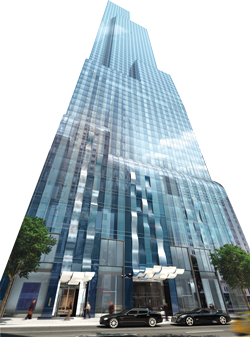City Council votes to streamline landmarks process
In response to mounting criticism of the city’s landmarks process, the City Council has passed a bill that imposes deadlines on the Landmarks Preservation Commission’s public review process. The new law, Intro 775-A, will force the commission to vote on landmarking a building or site within a year of its landing on the commission’s to-do list, also known as being “calendared.” The bill’s passage marks a victory for the real estate industry, which argued that the 50-year-old landmarks law was insufficiently transparent and placed too many restrictions on property owners who could not easily renovate calendared properties or demolish them. Preservationists criticized the new rules, saying that the commission would be robbed of flexibility and held to an artificial timeline. Under the new law, the commission will now have 18 months to clear the backlog of calendared sites.

One57
Plan to allow ‘megatowers’ stalls in state legislature
A controversial proposal backed by Mayor Bill de Blasio’s administration to permit taller residential buildings in dense commercial neighborhoods has stalled in the state legislature. The amendment would roll back a state law that caps the square footage of residential buildings, allowing the city to rezone a parcel for nearly twice the maximum square footage currently permitted. If approved, the change could usher in an era of “megatowers,” according to Crain’s. The de Blasio administration has said the plan would increase the supply of affordable housing, but critics view the plan as upzoning. “It’s a reflection of a different kind of city,” a planning expert told Crain’s. “This legislation may only affect a few sites, but it represents a potentially big shift in our policy making around housing.”
Brooklyn Bridge Park’s Pier 6 approved for housing
The governing board of Brooklyn Bridge Park has approved two residential towers at the park’s Pier 6. Robert Levine’s RAL Development Services and joint-venture partner Oliver’s Realty Group have been tapped to build the projects. The Brooklyn Bridge Park Corporation argued that the park’s mandate to be financially self-sufficient justified the developments, which are expected to pay for 50 years worth of pier maintenance and repair. The plan calls for a 28-story luxury condo tower along with a 155-foot-high rental building with 140 units, 100 of which would be affordable. Opponents, including The Brooklyn Heights Association, argued that the park is already financially self-sufficient from its initial commercial developments.
 Albany serves up ‘brunch bill’
Albany serves up ‘brunch bill’
Gov. Andrew Cuomo and state legislators have reached a deal to amend a state law dating back to the Prohibition era that bans morning sales of alcohol at taverns, bars and restaurants in New York. Under the bill, restaurant patrons can start drinking their bottomless mimosas and Bloody Marys beginning at 10 a.m. on Sundays. Presently, alcohol cannot be served at those establishments until noon on Sundays, much to the chagrin of European soccer fans who gather in bars early on Sunday to watch the matches. Many local restaurants flout the law at the risk of getting shut down. “It’s already happening, and now we’re just going to legalize it,” Igor Krnajski, a real estate developer and brunch goer, told the Associated Press.
